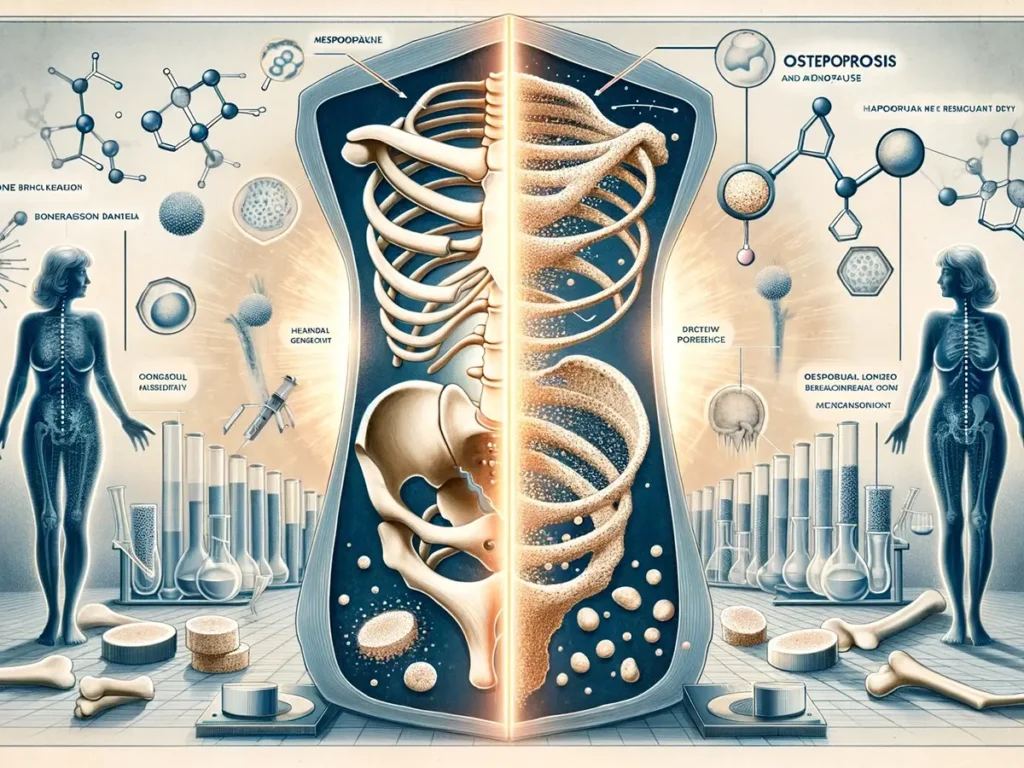Uncommonly, menopausal women may experience symptoms that are not typically associated with this stage of life. While hot flashes and mood swings are expected during menopause, there are atypical symptoms that women should be aware of and monitor closely. Women need to recognize and seek medical advice if they experience any unusual or unexpected symptoms during menopause, as these could be indicators of underlying health issues.
Key Takeaways:
- Pay attention to unexplained symptoms: Women should be vigilant about any unusual or atypical symptoms they experience during menopause, such as extreme mood swings, severe hot flashes, or sudden weight changes.
- Consult a healthcare provider: If women notice any concerning or abnormal symptoms during menopause, it is essential to consult a healthcare provider for a proper diagnosis and treatment plan. Ignoring such symptoms could lead to underlying health issues going undetected.
- Understand individual variations: Menopause symptoms can vary significantly from person to person, so awareness of what is normal for one’s body is crucial in identifying any potential atypical signs that may require medical attention.
Standard Symptoms of Menopause
One of the most common and well-known symptoms of menopause are hot flashes and night sweats. Hot flashes are sudden feelings of warmth that can cause sweating and skin redness, typically concentrated on the upper body. Night sweats are hot flashes during sleep, leading to excessive sweating that can disrupt rest. Hormonal changes cause these symptoms and can vary in frequency and intensity from woman to woman.
Hot Flashes and Night Sweats
Sweats can be triggered by stress, caffeine, alcohol, spicy foods, and tight clothing. While they are considered standard parts of the menopausal transition, they can still be uncomfortable and disruptive to daily life. Managing hot flashes and night sweats may involve lifestyle changes, hormone therapy, or other treatments recommended by a healthcare provider.
Irregular Menstruation and Hormonal Fluctuations
On average, women enter menopause in their late 40s to early 50s, but the process can begin earlier or later. Irregular menstruation, which may include shorter or longer cycles, heavier or lighter bleeding, or skipped periods, is a common sign of hormonal fluctuations during perimenopause. These changes are a natural part of the menopausal transition as the body adjusts to decreasing estrogen levels.
Flashes of hormonal fluctuations during menopause can cause symptoms like hot flashes and mood swings. Some women may experience more severe symptoms or have underlying medical conditions that exacerbate these changes. It is essential to consult with a healthcare provider to determine the best course of action for managing hormonal fluctuations and associated symptoms.
Mood Changes and Emotional Wellness
Changes in mood and emotional wellness are also typical during menopause, as hormonal shifts can affect the brain’s neurotransmitters and emotional regulation. Women may experience increased irritability, anxiety, or feelings of sadness. Practicing self-care, staying active, and seeking support from loved ones or a mental health professional can help manage these changes and promote emotional well-being.
Menstruation can also affect mood changes during menopause, as irregular periods and hormonal imbalances can impact emotional stability. Tracking menstrual cycles and symptoms can provide valuable insights into how hormonal fluctuations affect mood. Open communication with a healthcare provider can help address concerns and develop a personalized plan for managing mood changes.
Atypical Menopausal Symptoms
Definition and Overview
For women entering menopause, it is crucial to be aware of both typical and atypical symptoms that may arise during this transitional phase of life. Atypical menopausal symptoms refer to those that deviate from the standard experiences commonly associated with menopause, such as hot flashes, mood swings, and night sweats.
With atypical menopausal symptoms, women may experience a wide range of unexpected physical and emotional changes that can be confusing and concerning. These symptoms may not always be immediately recognized as related to menopause, leading to potential delays in seeking appropriate medical care.
How Atypical Symptoms Differ from the Standard
With atypical menopausal symptoms, women may encounter manifestations that are less commonly discussed in the mainstream conversation about menopause. These can include issues like joint pain, headaches, urinary problems, and memory loss, which may not be readily associated with hormonal changes occurring during menopause.
With atypical symptoms, the key difference lies in the presentation and frequency of these manifestations. While standard menopausal symptoms are more widely recognized and anticipated, atypical symptoms may catch women off guard due to their unexpected nature and potential impact on daily life.
Differing from the standard symptoms that are more widely publicized and discussed, atypical menopausal symptoms may require a higher level of awareness and proactive monitoring. Understanding these less common manifestations can empower women to seek timely medical advice and appropriate management strategies to address their individual menopausal experiences effectively.
Physical Atypical Symptoms
Cardiovascular Irregularities
Irregularities in cardiovascular health can manifest as atypical symptoms during menopause. Women may experience changes in blood pressure, heart rate, or even palpitations that are not typically associated with menopause. These symptoms can be concerning and should be monitored closely.
Women need to be aware of any chest pain, shortness of breath, or dizziness that occurs during menopause, as these could be signs of a more serious cardiovascular issue. Tracking these symptoms and discussing them with a healthcare provider is crucial for proper evaluation and management.
Changes in Vision
Any alterations in vision during menopause should not be dismissed as a normal part of ageing. Some women may experience blurred vision, dry eyes, or even changes in colour perception that are not typical menopausal symptoms. These changes could indicate underlying health issues that require attention.
The eyes are a window to overall health, and any unexplained vision changes should prompt a visit to an eye specialist or healthcare provider. Regular eye exams are essential during menopause to monitor potential issues and ensure optimal eye health.
Gastrointestinal Issues
To address gastrointestinal issues such as bloating, constipation, or acid reflux is essential during menopause. Hormonal fluctuations can impact the digestive system, leading to discomfort and irregularities that are not commonly associated with menopausal symptoms. Maintaining a healthy diet, staying hydrated, and managing stress can help alleviate these symptoms.
Cardiovascular health is crucial during menopause; any unexplained gastrointestinal issues should not be ignored. Seeking advice from a healthcare provider can help determine the underlying cause of these symptoms and provide appropriate management strategies.
Skin and Dental Conditions
Changes in skin texture, increased dryness, or gum sensitivity are atypical symptoms that some women may experience during menopause. These skin and dental conditions can be bothersome and impact overall well-being. It is essential to address these symptoms promptly to maintain skin and oral health.
A proper skincare routine and regular dental check-ups are essential during menopause to prevent or manage skin and dental conditions. Women should not hesitate to seek advice from dermatologists and dentists to address concerns and ensure optimal skin and oral health.
Neurological Manifestations
To address neurological manifestations like memory lapses, mood swings, or changes in cognitive function is crucial during menopause. These symptoms can be alarming and affect daily functioning. Women must proactively manage these manifestations and seek appropriate support and intervention.
Neurological health is vital during menopause; any persistent or worsening symptoms should be discussed with a healthcare provider. Cognitive exercises, stress management techniques, and a healthy lifestyle can help support neurological well-being during this transition.
Psychological and Cognitive Atypical Symptoms
Despite the common physical symptoms that often accompany menopause, women should also be aware of the psychological and cognitive atypical symptoms that can arise during this stage of life. These symptoms can be just as disruptive and should not be overlooked.
Memory Disruptions and Cognitive Decline
Cognitive changes, such as memory disruptions and difficulty concentrating, can affect women going through menopause. While it is expected to experience occasional forgetfulness or mental fog, persistent memory issues and cognitive decline may indicate something more than just typical ageing.
Women need to monitor their cognitive function and seek medical advice if they notice significant changes in their memory or thinking processes. Addressing these issues early on can help prevent further cognitive decline and improve overall quality of life.
Severe Mood Swings and Mental Health Concerns
Concerns about mental health can surface during menopause, with many women experiencing severe mood swings, anxiety, depression, and irritability. These emotional fluctuations can be challenging to manage and may impact daily life and relationships.
A proactive approach to mental health during menopause involves seeking support from healthcare providers, therapists, or support groups. Addressing these concerns can help women navigate this turbulent period more efficiently and improve their emotional well-being.
Sleep Disturbances Beyond Insomnia
Memory disturbances and cognitive decline can also extend to disruptions in sleep patterns for menopausal women. Beyond the common symptom of insomnia, some women may experience night sweats, vivid dreams, or restless legs that disrupt their sleep quality.
Sleep disturbances can exacerbate other symptoms of menopause and negatively impact overall health and well-being. Women must address these sleep disturbances and explore strategies to improve sleep hygiene and promote restful sleep during this transitional phase.
Lesser-Known Atypical Symptoms
Changes in Body Odor
For some women going through menopause, changes in body odour can be an unexpected and atypical symptom. This can be attributed to hormonal fluctuations that affect the sweat glands and the composition of sweat, leading to a shift in body odour. Women may notice that they sweat more or have a different scent.
Additionally, changes in body odor during menopause can be linked to the onset of hot flashes and night sweats, which are common symptoms of hormonal changes. Good hygiene practices and using antiperspirants or deodorants can help manage these changes in body odor.
Ocular and Oral Health Complications
Women may experience atypical symptoms related to their ocular and oral health during menopause. Dry eyes, blurry vision, and increased sensitivity to light are some ocular symptoms that can arise during menopause. On the other hand, oral health issues such as dry mouth, gum inflammation, and changes in taste perception can also manifest.
The hormonal fluctuations during menopause can contribute to these ocular and oral health complications. Women need regular check-ups with their eye doctor and dentist to address any changes or concerns in their vision and oral health.
Atypical Joint and Muscle Pains
Lesser-known symptoms of menopause include atypical joint and muscle pains that some women may experience. These pains can range from aching joints to muscle stiffness, often attributed to the changes in hormone levels that occur during menopause. Women may also notice increased joint pain or muscle aches during this time.
It is essential for women experiencing atypical joint and muscle pains during menopause to stay active and maintain a healthy lifestyle. Gentle exercises, stretching, and proper nutrition can help alleviate these symptoms and improve overall joint and muscle health.
Managing Atypical Symptoms
Not all menopausal symptoms are typical, and some women may experience atypical symptoms that require a different approach to management. Women must be vigilant and proactive in addressing these symptoms to ensure a better quality of life during menopause.
Lifestyle Adjustments and Home Remedies
One approach to managing atypical menopausal symptoms is through lifestyle adjustments and home remedies. Simple practices such as regular exercise, a healthy diet, stress management techniques, and good sleep hygiene can help alleviate symptoms like mood swings, insomnia, and fatigue.
Furthermore, incorporating natural remedies such as herbal supplements, acupuncture, and aromatherapy may also provide relief from atypical menopausal symptoms. Women must explore these options under the guidance of healthcare providers to ensure safety and efficacy.
Professional Medical Interventions
With atypical menopausal symptoms that are more severe or significantly impact daily life, professional medical interventions may be necessary. Women should consult with their healthcare providers to explore treatment options such as hormone therapy, medications, or other specialized interventions tailored to their specific symptoms and health needs.
Lifestyle modifications and home remedies may not always be sufficient to address atypical menopausal symptoms effectively. In such cases, seeking professional medical advice and interventions can help women better manage their symptoms and improve their overall well-being.
Alternative Therapies and Support Systems
Medical research has shown that alternative therapies such as yoga, meditation, mindfulness practices, and support groups can be beneficial in managing atypical menopausal symptoms. These approaches focus on holistic well-being and can complement traditional medical treatments.
To enhance the effectiveness of alternative therapies and support systems, women should consider incorporating them into their menopausal symptom management plan alongside other interventions. It is essential to approach these therapies with an open mind and consult with healthcare providers to ensure they are safe and appropriate for individual needs.
Preventive Measures and Early Detection
The Role of Regular Health Screenings
On the journey to managing menopausal symptoms effectively, regular health screenings play a crucial role in early detection and prevention. Routine screenings such as mammograms, bone density tests, and pelvic exams can help identify any potential health issues that may arise during menopause. These screenings can also aid in monitoring overall health and well-being, allowing for timely intervention.
By staying proactive with regular health screenings, women can take charge of their health during the menopausal transition. These screenings provide valuable insights into changes occurring in the body, enabling healthcare providers to offer personalized guidance and treatment options tailored to individual needs.
Proactive Communication with Healthcare Providers
On the path to optimal menopausal health, proactive communication with healthcare providers is essential. Open and honest discussions about any atypical symptoms experienced during menopause can help healthcare providers assess the situation accurately and recommend appropriate interventions. Building a trusting relationship with healthcare professionals can create a supportive environment for women to address their concerns and receive the necessary care.
Detection of any unusual symptoms or changes in menopausal health should prompt immediate communication with a healthcare provider. From irregular bleeding patterns to sudden mood swings, any deviations from typical menopausal symptoms should be discussed promptly to ensure timely evaluation and management. By establishing proactive communication channels with healthcare providers, women can navigate the menopausal journey with confidence and peace of mind.
When to Seek Medical Advice
Distinguishing Between Typical and Atypical Symptoms
The menopausal period can bring about a range of symptoms, both typical and atypical. It is crucial for women to distinguish between the two to know when to seek medical advice. Typical symptoms of menopause include hot flashes, night sweats, mood swings, and changes in the menstrual cycle. These symptoms are common and expected during menopause.
On the other hand, atypical symptoms are less common and may indicate underlying health issues that require medical attention. Atypical symptoms can include sudden and severe mood changes, extreme fatigue, unusual weight gain or loss, and persistent headaches. If you experience any of these symptoms, it is essential to consult with a healthcare provider to rule out any severe conditions.
The Significance of Reporting Atypical Symptoms
Symptoms that deviate from the typical menopausal experience can sometimes be overlooked or dismissed by women as part of the ageing process. However, reporting atypical symptoms to a healthcare provider is crucial for early detection and management of underlying health issues. You can receive a thorough evaluation and appropriate treatment plan by communicating these symptoms to your healthcare provider.
Ignoring atypical symptoms can lead to delayed diagnosis and potentially worsen health outcomes. Early intervention is key in addressing any health concerns contributing to these atypical symptoms. Your healthcare provider is there to help you navigate through these symptoms and provide the necessary support and guidance.
Symptoms that deviate from the typical menopausal experience can sometimes be a sign of other medical conditions that may require immediate attention. It is essential not to ignore these atypical symptoms and to seek medical advice promptly to address potential health issues.
The Impact of Atypical Symptoms on Quality of Life
Reporting atypical symptoms to your healthcare provider is crucial not only for your physical health but also for your overall quality of life. If left untreated, atypical symptoms can significantly impact your daily activities, mental well-being, and relationships. Seeking medical advice for these symptoms can help improve your quality of life and ensure you receive the appropriate care and support.
Addressing atypical symptoms early on can also prevent them from escalating and affecting your long-term well-being. Your healthcare provider can work with you to develop a personalized treatment plan that addresses the symptoms’ physical and emotional aspects, helping you navigate through this phase with confidence and comfort.
When atypical symptoms arise during menopause, it is crucial to seek medical advice promptly to address any underlying health issues and improve your quality of life. Your healthcare provider can offer valuable insights, support, and interventions to help you manage these symptoms effectively and enhance your overall well-being.
Summing up
To wrap up, menopausal symptoms can vary greatly among women, but some atypical symptoms warrant attention. Women should be aware of any extreme mood swings, severe hot flashes that interfere with daily life, significant weight gain or loss without explanation, or other symptoms that seem out of the ordinary. It is important for women experiencing unusual menopausal symptoms to consult with their healthcare provider for proper evaluation and treatment.
FAQ
Q: What are some atypical menopausal symptoms women should watch out for?
A: Some atypical menopausal symptoms to watch out for include severe hot flashes, excessive vaginal bleeding, sudden mood changes, extreme fatigue, and severe hair loss.
Q: How common are atypical menopausal symptoms?
A: Atypical menopausal symptoms are less common than typical menopausal symptoms, but they can still occur in some women during the menopausal transition.
Q: When should women seek medical attention for atypical menopausal symptoms?
A: Women should seek medical attention if they experience any atypical menopausal symptoms that are severe, persistent, or impacting their quality of life.
Q: What could atypical menopausal symptoms indicate?
A: Atypical menopausal symptoms could indicate underlying health conditions such as thyroid disorders, hormonal imbalances, or other medical issues that may require further evaluation and treatment.
Q: How can women manage atypical menopausal symptoms?
A: Women can manage atypical menopausal symptoms by consulting with a healthcare provider for proper diagnosis and treatment, adopting healthy lifestyle habits, and considering alternative therapies such as acupuncture or herbal remedies under medical supervision.






